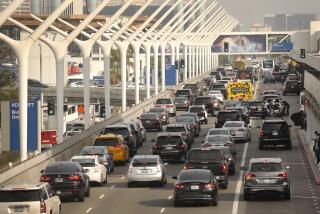No Idle Boast: L.A. Traffic Worst--Again
- Share via
It’s another repeat performance for Los Angeles.
No, not the three-time NBA champion Lakers. For the 15th year in a row, L.A. has claimed the title of the most traffic-choked urban area in the nation.
The region won the unenviable ranking in an annual traffic mobility study released Thursday by the Texas Transportation Institute. The study calculated that Los Angeles-area motorists spent an average of 136 hours in rush-hour congestion in 2000--an increase of two hours over 1999. It also estimated that 75% of the area’s freeways and streets are clogged during commute times--another statistic that leads the nation.
By all estimates, Los Angeles is ready to 16-peat.
“I wish I could say that there are fixes that could make L.A. move down the list, but I don’t foresee that,” said Larry Fisher, executive director of Transportation California, which represents the highway construction industry.
But Los Angeles is not alone in suffering from worsening traffic: Traffic delays increased in every major urban center in the country between 1999 and 2000, according to the study.
Even smaller cities--such as Austin, Texas; Charlotte, N.C., and Albuquerque, N.M.--were said to be facing big-city traffic congestion.
Six California urban areas--San Francisco/Oakland, San Jose, San Diego, San Bernardino/Riverside and Sacramento, in addition to L.A.--ranked among the 25 most congested regions.
The study attributed the increased congestion primarily to a strong economy, which leads more people to drive to work, shop, travel and spend. But in addition, in California and most of the rest of the country, new roadway construction has failed to keep up with increased demand.
The freeway construction industry responded to the study by calling on state and federal agencies to spend more on roadway construction. “It is clear that we are not providing the level of public investment necessary to maintain the existing highway, bridge and transit system, much less invest in needed new capacity,” said Pete Ruane, president of the American Road & Transportation Builders Assn.
Other transportation experts say adding more pavement is only a temporary solution.
James Corless, California director of the Surface Transportation Policy Project, said California should attack traffic congestion by trying to reverse the growth patterns that promote the development of affordable housing in suburbs, miles from job centers.
For the first time, the methodology of the Texas Transportation Institute’s annual study has come under some criticism.
The Washington Department of Transportation withheld its financial support for the study this year, saying the traffic congestion estimates do not reflect real-life conditions.
A spokeswoman for the agency said the study relies too much on a mathematical calculation that are based on the number of cars that a certain length of roadway can accommodate.
A DOT spokeswoman in Washington, Linda Mullen, said the study’s calculations do not take into consideration congestion relief efforts such as freeway ramp meters, tow-truck patrol programs and traffic monitoring efforts that use freeway cameras. Such efforts, she said, help move the same number of cars more quickly through the same stretch of road.
Jeff Morales, director of the California Department of Transportation, raised the same concerns and said his agency is also considering withdrawing its financial support.
He pointed out that Gov. Gray Davis recently approved the largest transportation spending plan in state history. The budget includes many freeway improvement projects that will not be included in the traffic congestion calculations, Morales said.
“It’s not as accurate a snapshot as it should be,” he said.
Tim Lomax, a researcher with the Texas Transportation Institute, agreed that the study cannot calculate the positive effects of such efforts, but he said he hoped that would change in the near future.
Still, he said, such a fix in the study might change a few of the statistics but would probably not end Los Angeles’ reign as the city with the nation’s worst traffic.
More to Read
Sign up for Essential California
The most important California stories and recommendations in your inbox every morning.
You may occasionally receive promotional content from the Los Angeles Times.














